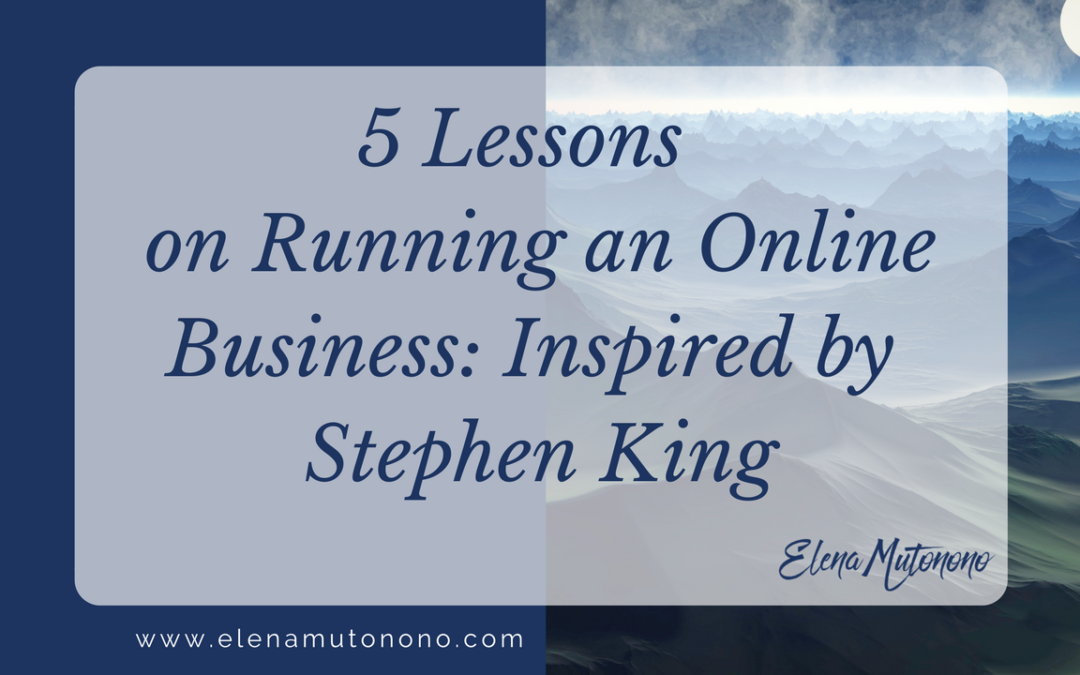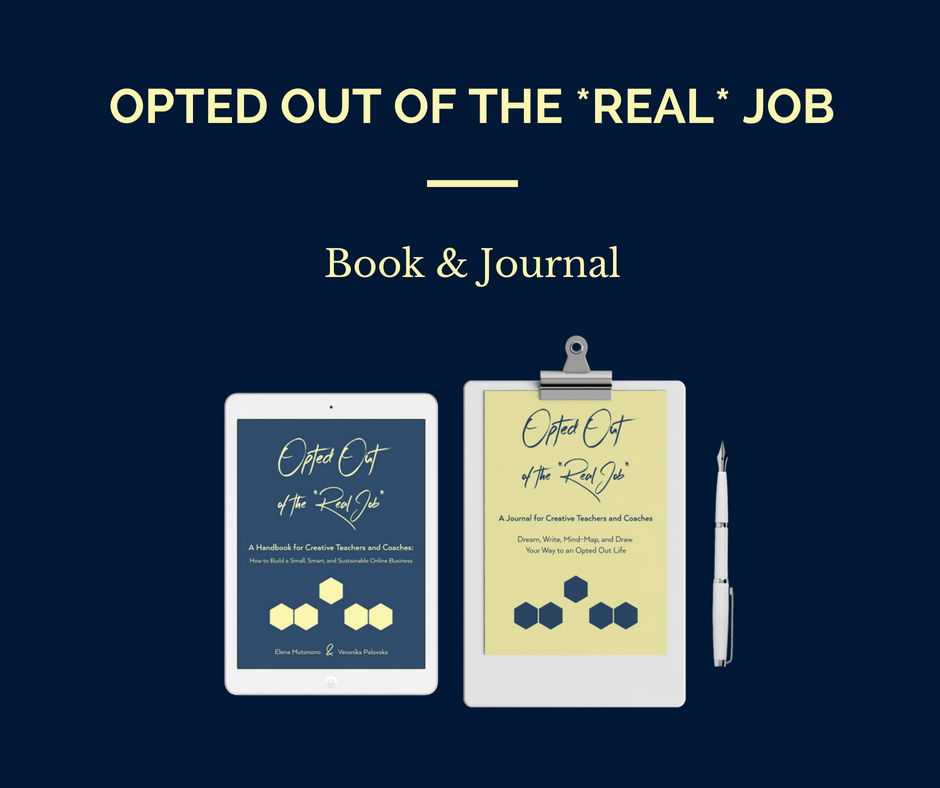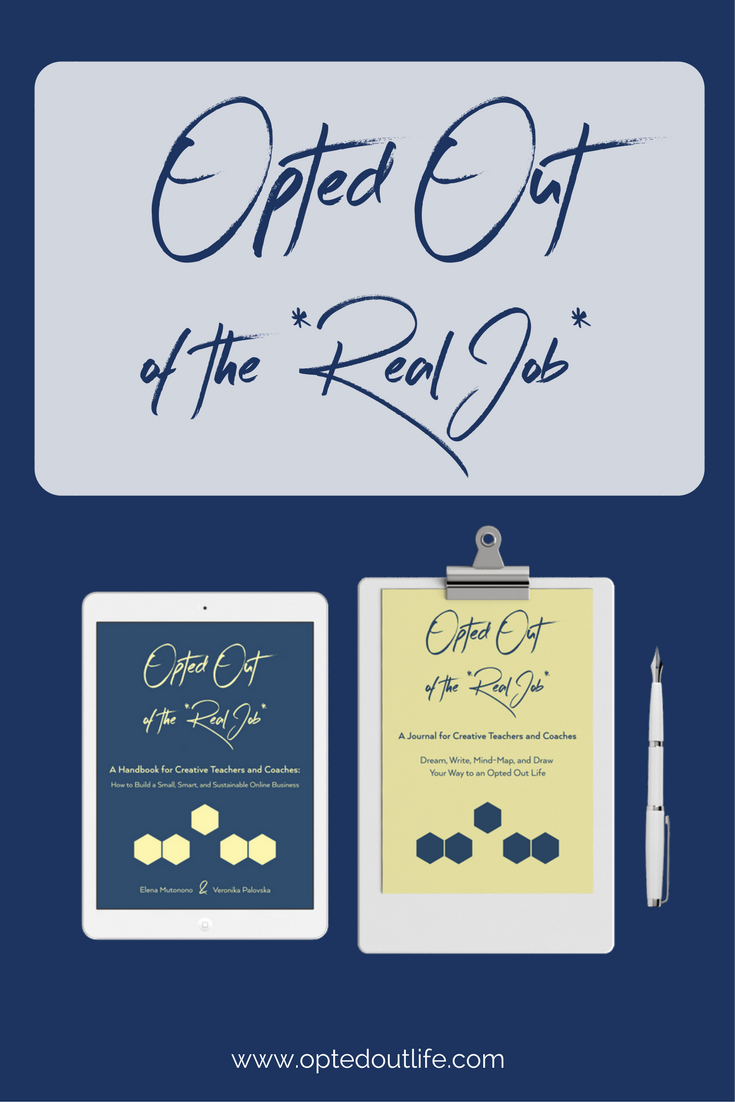The book I wrote with Veronika Palovska, Opted Out of the *Real Job* is becoming an “Amazon reality” in just a few days. This is the second edition of the book I wrote at the end of 2015. That was my first small product for online teachers.
I must say that what I have now is what I envisioned 2 years ago, but at the time I had no resources nor understanding of how I would do it. I did it anyway because the core message of the book was stronger than my excuses.
Have you ever heard yourself say things like, “I’d love to create a sustainable course/program/or be selling books in about 2 years.” Well, 2 years isn’t a long time, and if you want something sustainable in the future, you’ll have to create a lot of small and unattractive things now.
Your two years from now has to begin now.
Two years to develop the concept, create a community, build a list, send regular updates, share what you know and learn what you don’t to share it later. Two years to shift your mindset and fine tune your core message.
Two years to opt out of things that may hold you back:
- Perfection
- Chasing what sells
- Spawning endless tips (without empathy)
- Seeking comfort and security
- Pleasing everyone.
This post is a reflection on each of these lessons, inspired by my recent reading of Stephen King’s On Writing (see the quotes below)
Stephen King turns 70 today, so there’s no better time than now.
#1: Opt Out of Perfection
“Language does not always have to wear a tie and lace-up shoes.”
Running a small business is a creative process that never stops. Sometimes I have a feeling I’m jumping on and off a moving train, and I can’t stop it.
The moving train is the internet, and working online is like living on a train. You make it as comfortable as you can, but it will never be the *real* job with “stability, security and safety” (all relative S-s, of course).
We’ll want to make it such, but the more time we spend trying to “lace up” the shoes, the more time we lose making an impact. If you teach online, get used to the shaking, the jumping on and off, the noise, the never-there.
If you teach online, get used to the shaking, the noise, the never-there.Click To Tweet
#2: Opt out of chasing what sells
“What would be wrong, is to turn away from what you know and like … in favor of things you believe will impress your friends, relatives, and … colleagues. What’s equally wrong is the deliberate turning toward some genre or type of fiction in order to make money. It’s morally wonky, for one thing – the job of fiction is to find the truth inside the story’s web of lies, not to commit intellectual dishonesty in the hunt for the buck. Also, brothers and sisters, it doesn’t work.”
To bring it closer to home: when you don’t like teaching something but you teach it anyway (cause “this stuff sells”), you’ll find yourself stuck. You may have to do it for a temporary cash flow situation, with a firm understanding that it’s temporary.
But long-term — it’s like hiring yourself to do the job you hate. Why self-employment then? There’re plenty *real jobs* out there.
“When you see a novel with “In the tradition of (John Grisham/Patricia Cornwell/Mary Higgins Clark/Dean Koontz)” on the cover, you know you are looking at one of these overalculated (and likely boring) imitations.”
#3: Opt out of spawning endless tips (without empathy).
“When the reader hears strong echoes of his or her own life and beliefs, he or she is apt to become more invested in the story.”
Tips are helpful. They give your audience information and guidance.
But that’s not why people become your clients. There’s something deeper that creates trust — when your client resonates with your life experiences and beliefs. I used to think that people hired me because of my qualifications. But their answers have surprised me:
- I like the poem you wrote in your brand story
- I saw your family pictures and knew that you would get me.
- I liked that you were talking small, which wasn’t intimidating.
Oh, and by the way, nobody ever asked me for my certificates, diplomas, and GPAs.
***
Opted Out of the *Real Job* is a handbook to help you dig deeper and create meaning with your online teaching business. It’s not for everyone because digging is hard work. But the hard work pays off in the end because you realize what it means to find freedom while working online, not replace one type of an office job with another. Paperbacks available on Amazon. Buy a digital copy here.
#4: Opt Out of Seeking Comfort.
“No matter how good you are, no matter how much experience you have, it’s probably impossible to get the entire fossil out of the ground without a few breaks and losses.”
King likens writing to digging up fossils from the ground. I find the metaphor similar to running an online business. Sometimes you strike the ground and hit something hard. You’re elated and motivated to keep digging.
You get impatient when you realize that the big thing you’re digging is getting bigger. Sometimes you pull it out too soon or strike it too hard, and it doesn’t come out the way you thought it would.
We want to avoid it. The first instinct is to give up. You can’t stand the losses that come with this process, so you do nothing. But you can’t avoid discomfort when you want to create something remarkable.
“I’ve never achieved a single thing in my career or my life, comfortably.” Brené Brown (watch her full interview with Marie Forleo here).
#5: Opt Out of Pleasing Everyone
“Someone… once wrote that all novels are really letters aimed at one person. As it happens, I believe this. I think that every novelist has a single ideal reader; that at various points during the composition of a story, the writer is thinking, “I wonder what he/she will think when he/she will read this part?”
Sometimes the desire to please everyone comes from our inner insecurities when we can’t accept that someone may not like what we do. Sometimes it’s triggered by someone’s wrong interpretation of what we do.
Let’s face it, it’s tough.
When you bring your best into the world, spend hours putting together a project, and then someone criticizes you without deeper understanding of what you do, it hurts.
You may want to explain yourself, but it’s not helpful.
So quit trying to change people that aren’t enrolled on the journey with you. As Brené Brown said, “If you’re not in the arena, sweating and shedding blood, I’m not interested in your feedback.”
Instead, think about your ideal client and think of pleasing him/her only.
5 lessons on running an #online #business that lasts: inspired by Stephen King's 'On Writing.'Click To Tweet
Your reflection questions, quotes and links for further reading:
- If at the root of our perfectionism is the fear of failure, can we think of failing differently? What if our success is determined by how much we’re willing to fail?
“You become a winner because you’re good at losing.” Seth Godin.
“If you’re not prepared to be wrong, you’ll never come up with anything original.” Sir Ken Robinson.
- What would you do with your life if money wasn’t the issue? How can you incorporate your passion into your daily job? How could you make it your daily job?
- Why do you teach what you teach? Are you just providing “tips and tricks,” or is there something that makes your work more meaningful?
- Who is your ideal client and how do you connect?
Last update: October 2022.




 Welcome to my nook where *Big Magic* happens. My name is Elena Mutonono, I help small business owners package their services as digital products and sell them online. I want you to work smarter, not harder. Increase your impact beyond your current face-to-face clients. Grow your business as you reach more people all over the world.
Welcome to my nook where *Big Magic* happens. My name is Elena Mutonono, I help small business owners package their services as digital products and sell them online. I want you to work smarter, not harder. Increase your impact beyond your current face-to-face clients. Grow your business as you reach more people all over the world.








Well, of course, I love this. And now I want to read “On Writing” too. Loved your train metaphor, and this “Well, 2 years isn’t a long time, and if you want something sustainable in the future, you’ll have to create a lot of small and unattractive things now.” It’s the same when you write, it really is. I think you have to remember this in order to accept that your early work will seem cringe-worthy in a few months…or a year.
Trisha, I thought of our conversation while writing this post. So happy you enjoyed it <3 Since I'm now finished with the book, there're a few "bonus" quotes that work both for writing and for business:
"The scariest moment is always just before you start. After that, things can only get better." and
"Writing isn't about making money, getting famous, getting dates, getting laid or making friends. In the end, it's about enriching the lives of those who will read your work, and enriching your own life, as well."
These summarize everything I've written in the post. What we do with our businesses is enriching the lives of others, but many will never opt out because of how scary it feels. Not "completing your checklist at your job" but actually enriching lives.
I hope many feel empowered after this post to pursue their dreams, no matter how long it takes them.
That was great Elena. Thank you.